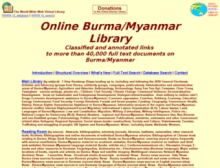Resource information
Fish farming (aquaculture) is important to Myanmar’s food security and is developing and
transforming quickly. This study presents findings from a new field survey of the farmed
fish value chain that is more detailed and broader than any previous study conducted in
Myanmar. Many of our findings are at odds with what we perceive as conventional wisdom
about fish farming in Myanmar. The findings have important policy implications to unlock
the sector’s full growth potential and food security contributions....Fish is important for domestic food security – it is the leading purveyor of animal protein
and the lead provider of micronutrients, important especially for child development, to
Myanmar consumers. Fish is important in the food budget of households: nearly as much is
spent on fish (14% of food expenditure) as on rice (19% of food expenditure). Fish farming
also generates a lot of employment – about twice as much per acre as paddy farming. Fishfarming
accounts for about 20% of domestic fish consumption in Myanmar. This is a long
way behind neighboring Thailand and Bangladesh (about 80% and 55%, respectively);
farmed fish already accounted for about 20% of the fish consumed in both these countries
by the late 1980’s....Even though it is a common perception that aquaculture output is mainly exported, in fact,
roughly 20% is exported, and 80% goes to the domestic market. We anticipate that the
export share will even decline further in the near to medium term as the Myanmar urban
market grows....


